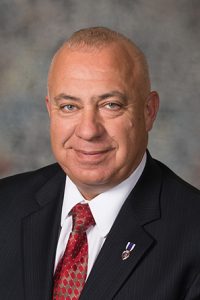Resilience training; PTSD injury claims proposed for first responders
The Business and Labor Committee heard testimony Jan. 27 on a bill meant to address the mental health toll experienced by emergency first responders.

LB963, sponsored by Gordon Sen. Tom Brewer, would provide first responders with opportunities to receive resilience training to help prevent or mitigate the effects of post-traumatic stress disorder.
The culture among first responders is one of toughness, Brewer said, which can lead to failure to recognize the symptoms of PTSD caused by trauma experienced while on the job.
Brewer said that receiving a diagnosis of PTSD following a traumatic injury suffered during his military service finally explained his inability to sleep and maintain relationships, as well as memory loss and increased irritability.
“You can only do this work so much and have it not tear away at the fabric of your being,” he said. “You can hide it all you want, but at some point, it will tear you in two and the result of that will cause issues that are unfixable [without treatment].”
The bill would allow first responders to establish a presumptive case of PTSD from cumulative injury or stress as a personal injury for workers’ compensation purposes.
To establish such a case, the first responder must show that he or she: underwent a mental health examination before the onset of the mental injury or illness, obtained testimony from a qualifying mental health professional that he or she suffers from a mental injury or illness and participated in resilience training prior to the onset of the mental injury or illness and annually thereafter.
The state Department of Health and Human Services would reimburse first responders for resilience training if their employers do not.
Under LB963, a practicing physician, psychologist, physician assistant, advanced practice registered nurse, mental health practitioner or clergy member all would be qualified to render an official diagnosis of PTSD.
Tyler Fausset was diagnosed with PTSD following a particularly traumatic call as an Omaha firefighter. He supported the bill, he said, because it provides a means for all first responders to build resiliency and continue to serve their communities to their fullest potential.
“PTSD can sometimes be described as an individual falling down into a large hole by themselves, with no way out, never to see the light and only to sit in the darkness,” Fausset said. “What LB963 says is that we as a community … are saying to our first responders that we’re jumping in this hole with you, we’re going to give you the tools, the resources and the education to get out and that we support you.”
Heather Livengood of Omaha also spoke in favor of the bill. She said her husband, Rich, took his life in 2014 following a long firefighting career that resulted in undiagnosed PTSD.
“The resiliency training … will give our responders the necessary equipment to process the things that they see every day—things that the rest of us probably will never have to witness,” Livengood said. “It is this training that I wish my husband had had the opportunity to receive and it is this training that will keep our first responders on the front lines on the way to mentally healthy and happy retirements.”
Representing the First Responders Foundation, Jodi Teal also supported LB963. Incidents of PTSD are reported to be five times higher among first responders than other professions, she said, but stigmas around mental health issues persist.
“We are told that when the oxygen mask drops from a plane, its best to [put on yours] before you put the mask on the individual next to you,” Teal said. “The same thing needs to be said for our first responders because [they] cannot be their best if they’re not taking care of themselves.”
Lynn Rex of the League of Nebraska Municipalities spoke in opposition to the bill. Her organization is supportive of the intent behind the bill, she said, but is concerned by the broad language that potentially would allow unqualified people to make medical diagnoses.
“Clergy members have a very important role in our communities across the state, but they are not qualified to make this determination in our view,” Rex said. “They certainly can refer you to a professional, but they are not that [mental health] professional.”
The committee took no immediate action on the bill.

